Anal Fissures Treatment & Surgery in Chirag Enclave, Delhi
Gastroenterology is a branch of medical science that pertains to the detection, diagnosis and treatment of various ailments and disorders of the GI or gastrointestinal tract.
Gastroenterologists are specialist doctors who have gained expertise in the treatment of the organs of the human digestive system. The digestive system comprises the mouth, esophagus, stomach, small intestine, large intestine, liver, pancreas and rectum.
Surgeons and gastroenterologists need to perform surgical procedures for the treatment of severe, chronic or acute disorders of the GI tract. These surgical procedures have improved to a great extent, due to the advancements in technology and research for medical science. These days, doctors prefer MIS (minimally invasive surgeries) to ensure a speedy recovery, minimal incisions and scarring along with a higher accuracy and success rate.

What are anal fissures?
Anal fissures (anal ulcers) can be described as cuts, cracks or tears that are formed on the lining of the anus. These cracks can be extremely painful and also cause bleeding and discomfort. They are formed as a result of extreme constipation, diarrhea or pain and pressure caused while passing large/hard stools.
Anal fissures can be formed inside the anus, along the lining of the rectum or at the outer ring (anal sphincter). They are formed due to lack of adequate fiber intake. Medication can help treat minor cases of anal fissures, but those who suffer from extreme symptoms require surgeries.
To seek treatment, consult a general surgery doctor near you or visit a general surgery hospital near you.
What are the symptoms of anal fissure?
- Pain during bowel movements
- Pain after passing stools (usually lasts for hours)
- Bleeding at the anus
- Chafing, burning, itching sensation
- Visible crack/lump near the anus
- Blood in stools
- Painful constipation
- Diarrhea
If you have experienced any of these symptoms, you should immediately seek medical consultation to treat your anal fissures.
Request an appointment at Apollo Spectra Hospitals, Chirag Enclave, New Delhi.
Call 1860 500 2244 to book an appointment.
What are the causes of anal fissures?
The causes of anal fissures may vary with individual patients. Some of the common causes of anal fissures are:
- Persistent diarrhea
- Damage to the inner lining of the anus and anal canal
- Intestinal dysfunction
- Pregnancy
- Childbirth
- STDs/STIs such as syphilis, herpes, etc
- Constipation/hard stools
- Strain, tightening, injury or infection in the anal sphincter
- Crohn's disease
- IBD (inflammatory bowel disorder)
- Ulcerative colitis
- Stool infection
When do you need to see a doctor?
The mild symptoms from non-severe cases of anal fissures may go away on their own, within a week or two. If the symptoms of anal fissures are severe or recur, then the disorder must be taken seriously. People who suffer from chronic or painful anal fissures must seek medical consultation at the earliest.
Gastroenterologists can treat anal fissures effectively and prevent their recurrence. If you observe any pain or symptoms of anal fissures,
you can consult a gastroenterologist at Apollo Hospitals.
Request an appointment at Apollo Spectra Hospitals, Chirag Enclave, New Delhi.
Call 1860 500 2244 to book an appointment.
How are anal fissures treated?
Following are some of the many ways to treat anal fissures:
- Consuming stool softeners
- Increasing fiber intake, fiber supplements or fibrous foods
- Increasing fluid intake
- Taking Sitz bath to relax the muscles
- Applying topical pain relievers like lidocaine
- Using ointments such as hydrocortisone or nitroglycerine
- Calcium channel blocker ointment
- Botox injections to the anus
- Surgery - Anal Sphincterectomy
For patients who suffer from severe symptoms of anal fissures, gastroenterologists may recommend surgical procedures to treat them. Anal sphincterotomy is performed to treat anal fissures, by making incisions/cuts on the muscle that controls the anal sphincter. These cuts allow the muscle to relax and facilitate healing.
Conclusion
Anal fissures are a painful medical disorder that might not go away on their own. For patients who suffer from recurring or chronic anal fissures, anal sphincterotomy has been highly beneficial. Gastroenterologists prefer lateral internal sphincterotomy for most cases due to the 90% success rate in fully eliminating anal fissures.
For patients who suffer from chronic, recurring or severe anal fissures, surgery is a highly effective form of treatment. Anal sphincterotomy produces highly favorable results and successfully treats anal fissures within 1-2 weeks.
If anal fissures are not treated soon, they can worsen. The pain can increase along with the severity of fissures. The spasms, chafing, and scarring can cause delayed healing of the wound.
No. It causes mild pain on most occasions that subsides within 2-4 days with proper care and medication. The post-op pain is a lot less than the pain caused by anal fissures.
Symptoms
Our Top Specialities
NOTICE BOARD
CONTACT US
CONTACT US
 Book Appointment
Book Appointment


.svg)
.svg)
.svg)
.svg)








